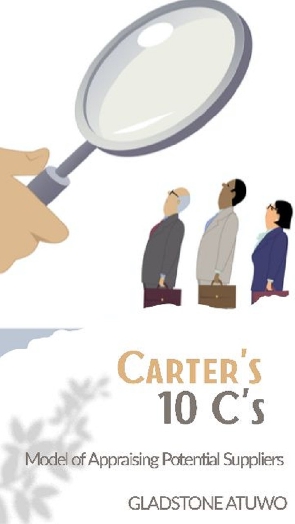Opinions of Tuesday, 14 March 2023
Columnist: Gladstone Atuwo
The fair applications of Carter's 10 C's to help you decide on the best partners for your small business's specific needs
Bringing in the ultimate selection of suppliers for any component of your business enterprise is important to improve your supply chain. Make it wrong, and the outcome can be both expensive and turbulent. Make it right, and you can create a stable, mutually healthy partnership.
You may chance upon a supplier that tenders a favorable price, but afterward, recognize that the quality of their products and services does not conform to your anticipation. And they might not notify you of the advancement of your orders.
Conflicts between your procurement needs and what a supplier provides can increase costs, pose delays, and likely impair your enterprise's prestige – for example, if the tools or resources provided are substandard.
Clarifying the 10 C's
The 10 Cs are standards for evaluating the appropriateness of a prospective supplier as proposed by Ray Carter in 1995. It is utilized as a checklist when determining which supplier to move toward, and who to circumvent.
Carter's 10 Cs can constitute the rationale for a robust Procurement Management policy for your enterprise. It aids you to assess prospective suppliers in the categories that are valuable to you, and can vastly enhance your supply chain management. Keep in mind likewise, that with the better agile and gig economy common presently, suppliers may as well be Small to Medium enterprises (SMEs) and not merely large corporates.
The checklist can also assist you to negotiate a favorable price. For instance, if you select a certain weak component in a supplier, you can apply this understanding to bargain for a reduced price particularly if you assumed that the supplier's weakness presents a risk for your enterprise and you ought to decide to lessen this risk.
When you analyze a supplier, develop exploring questions; ones that will reveal the degree of fact that you need to make a knowledgeable judgment. Where feasible, discuss with current clients as well as the suppliers themselves.
The 10 Cs include:
Competency
Capacity
Commitment
Control
Cash
Cost
Consistency
Culture
Clean
Communication
APPLICATION OF THE 10Cs IN YOUR SUPPLIER SELECTION
Competency
Only focus on the track record of the suppliers.
How: Create a detailed appraisal of their capabilities, and match them against your requirement. Then consider what other clients regard.
How satisfied are they with the supplier?
Have they experienced any challenges?
And look out for reasons why former customers altered the suppliers.
NB: In doing so, seek customers whose requirements and values are identical to yours, ensuring that the data you accumulate is crucial to your enterprise.
Capacity
The supplier needs to have enough ability to handle the size of orders based on your company's requirements.
How: Inquire about how fast they will be competent to react to your demands and to supply and market instabilities.
Do they possess the resources to satisfy your demands, putting into consideration their obligations to other clients? (Such as tools, staff, storage, and available materials.)
NB: Observe the resources of the supplier similarly.
Commitment
The supplier ought to deliver proof that they are obliged to you and have high-quality standards.
How: Where applicable, seek quality endeavors within the institution like the Six Sigma or ISO 9001.
NB: Watch out for proof of their current obligation in satisfying your needs, whatever the requirements of their other clients.
Control
This deals with their control over their processes and supply chain.
How: Inquire how much control this supplier has over their procedures, processes, policies, and supply chain.
How will they ensure that they deliver invariably and dependably, especially if they depend on limited resources, and if these resources are handled by another institution?
NB: It is also key to enquire about their adherence to the General Data Protection Regulation (GDPR).
Cash
The financial stability, including liquidity and favorable cash exchange of the supplier.
How: Assess the financial health of the supplier to identify its positive or negative cash status which helps reveal if the supplier is in a much better condition to withstand economic fluctuations.
Does this supplier possess enough cash available, or are they financially stressed?
And what data can the supplier provide to showcase their prevailing financial buoyancy?
Cost
The supplier's fees in comparison to analogous suppliers' fees
How: Consider the prices of the product or service that this supplier offers.
How does it compare with the other alternatives that you're examining?
NB: It's reasonable to factor cost to be a key consideration when choosing a supplier.
Nevertheless, the cost is at the center of the 10 Cs list for a purpose. Other factors like a commitment to quality and financial status, can likely influence your entity much more than cost alone, especially if you plan to depend on the supplier in the long run.
Consistency
The supplier's ability to make the same products and quality continually
How: Ask prospective suppliers about their technique, and, if feasible, get a demonstration and a tested product/sample.
How will this supplier ensure that they regularly offer high-quality goods or services?
Do they have a solid track record?
Are they an industry entrant with an innovative technique?
NB: No one can be perfect all the time. However, the supplier should have processes or procedures in place to ensure consistency.
Culture
The core values of the supplier.
How: Seek out suppliers that have attained acknowledgment within the sector for their ethical excellence to identify the institution's values
What if your firm's most relevant value is quality, and your main supplier concerns more about achieving deadlines? These differences could imply that they are desirous to beat the system in a way that could be inappropriate to you.
NB: The exemplary business associations are established on mutually fitting organizational values.
Clean
The suppliers care for people and the environment.
How: Appraise the supplier's dedication to sustainability and their compliance with environmental regulations and best practices.
What efforts are they carrying out to lessen their environmental footprint?
Does this supplier delight their people and the populace around them satisfactorily?
Do they have prestige for Corporate Social Responsibility, and for doing ethical business?
NB: Request to see proof of any green commendations or awards they have achieved
Communication
The supplier's quality and means of communication
How: Ask how the supplier designs to remain connected with you. It's likewise critical to unravel how the supplier will manage communications in the occurrence of an emergency.
Will their presented communication strategies agree with your desired strategy?
And who will be your reference at this organization?
How fast will they alert you if there's a supply fluctuation?
How will that communication take effect?
And will you be capable to contact top management, if you desire to?
NB: Communication is especially essential if you're overseeing daily operations that you outsource, or if you're doing business with independent workers or advisors who deliver key services.
In conclusion, ensure to verify the components where the supplier is weak because some of these could render a partnership difficult.













